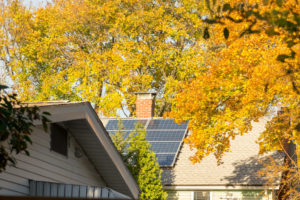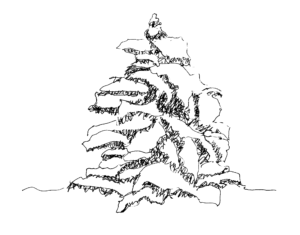For everything, there is a season, and late fall is the season for cleaning up. Take down the tomato stakes, put away the lawn chairs, and move all the clutter away from your windows and doors so you can feel if there are any drafts coming in. Air leaks make your home colder, and make you waste money and pollute the air with more greenhouse gases in a Sisyphean attempt to heat the great outdoors. Areas around pipes, electrical outlets, baseboards, vents, and pull-down attic stairs are also common sources of air leaks, which can usually be solved with caulking or weather stripping. The US Department of Energy lists helpful techniques for detecting leaks large and small.
Replace your heating system’s air or oil filters, seal any leaks in the ducts, and consider a programmable thermostat to automatically adjust the temperature when you’re not home. Make sure your outdoor air vents aren’t blocked by some kind of nest or crumpled leaves. The bald-faced hornets that make curious tree-colored paper balloons on the side of houses should have died with the first frost.
Speaking of insects, don’t be in too much of a hurry to clean up all your garden’s foliage. It may feel satisfying to cut down brown flower stalks and rake the garden down to bare dirt or mulch in the fall, but when you do that, you eliminate all the places that insects overwinter in your garden. Native bees burrow into bee balm and tall-grass stems or hunker down in the leaf litter. Swallowtail butterflies overwinter in chrysalises attached to stems and fallen leaves. Native ladybugs nestle down in leaf litter too (the ladybugs that swarm houses are Asian imports). The Xerces Society, which works to protect invertebrates, recommends that northern gardeners leave the last season’s plants alone until after filing taxes in April, or until apple trees have finished their bloom.
If you feel compelled to bring more order to the natural world, Habitat has opportunities to clean up the outdoors in December and January.
Autumn Cleanup
Saturday, December 7, 10 AM–noon
Mass Audubon’s Habitat Education Center and Wildlife Sanctuary, 10 Juniper Road, Belmont
Rake, cut firewood, haul brush, and get the sanctuary ready for winter. To register, see massaudubon.org or call 617-489-5050.
New Year Trail Tending
Sunday, January 5, 1–3 PM
Mass Audubon’s Habitat Education Center and Wildlife Sanctuary, 10 Juniper Road, Belmont
Bundle up and come pack down trails, look for wildlife tracks, or do some winter pruning. Children under 9th grade must be accompanied by an adult. Tools and gloves provided. To register, see massaudubon.org or call 617-489-5050.
Even though your roses have given up the ghost, there’s still plenty to see outside. It’s easier to see the contours of the landscape when the plants have died back–the hollows that glaciers scooped and the drumlins they deposited, the ridgelines and slopes and fault buckles. The “Bloody Buff” fault lines in Lexington’s Minuteman National Historic Park are easy to find in the early winter, and Bostongeology.com has a map of locations.
Plenty of living creatures become more visible in the early winter too. Some birds become more obvious when leaves no longer obscure the view of trees where they nest, and owls’ midwinter mating calls carry farther in the cold, clear air. Tracks in snow and mud reveal the paths of rabbits, squirrels, foxes, weasels, coyotes, deer, and mice whose trailing tails leave tiny lines in the snow. Evergreen trees are continuing to photosynthesize, finding nourishment in the slightest sunlight. Several local groups will happily help you find the traces of life in the winter world.
Yoga and Mindfulness in Nature
Saturday, November 16, December 21, and January 11, 9:30–11 AM
Mass Audubon’s Habitat Education Center and Wildlife Sanctuary, 10 Juniper Road, Belmont
After a 45-minute slow and gentle yoga class indoors, head outside to explore the trails of Habitat. The poses and flow will prepare the class for a mindful walk around the property, linking a simple seasonal theme during practice with what you might find as the class explores. Themes are November 16: “Being Grounded & Getting Ready for Winter”; December 21, “Inner Calm & Winter Solstice”; January 11, “Gratitude & Mid-Winter Quiet.” $16 Mass Audubon members, $20 nonmembers. To register, see massaudubon.org or call 617-489-5050.
Forest Explorations at the Fells
Saturday, November 16, 9:30 AM–noon
Flynn Rink Parking Lot, Medford
Join a biodiversity walk in the Fells and explore how seasons pass and affect and shape our plants and wildlife in this beautiful urban forest. Observe and record the flora and fauna in various locations of the woods, starting from the Flynn Rink parking lot. This walk is part of the Earthwise Aware effort to study biodiversity and collect data about the impact of climate change on the synchronicity of fauna and flora lifecycles. To register, see earthwiseaware.org, or contact Claire at citizenscience@earthwiseaware.org
Plant & Wildlife Monitoring at The Fells
Wednesday, November 20, 9:30 AM–12:30 PM
Gather science field information relating to plants, birds, and insects at the Fells with Earthwise Aware.
In the course of 3+ hours, the group will survey four plant phenology sites and two arthropod monitoring sites, and monitor bird activity at two ponds and record information following nationally standardized phenology and biodiversity protocols to share with global platforms. To register, see earthwiseaware.org, or contact Claire at citizenscience@earthwiseaware.org
Giving Thanks for Nature and Our Senses
Friday, November 29, 10 AM–1 PM
Drumlin Farm Wildlife Sanctuary, 208 South Great Road, Lincoln
Spend your Black Friday away from the malls and outside in nature! Take a walk through the sanctuary as local artists give trailside performances, then contribute your own expressions of thanks with family-friendly crafts and activities. Free with admission: $9 adults, $6 children ages 2–13, free for Mass Audubon members. For more information, see massaudubon.org or call 781-259-2255.
Evergreens and Tea
Wednesday, December 11, 10–11:30 AM
Mass Audubon’s Habitat Education Center and Wildlife Sanctuary, 10 Juniper Road, Belmont
Pines, Firs, Hemlocks, and more—discover trees that offer year-round beauty on a tree walk around Habitat. The program will finish indoors with a cup of evergreen tea. $6 Mass Audubon members, $8 nonmembers. To register, see massaudubon.org or call 617-489-5050.
New Year’s resolutions are coming up fast. How about learning more about the larger issues confronting our society now so you can plan your actions for next year? Learn about corporate sustainability, food policy, and transportation and communities, and decide what you will do with your 2020.
Impact Unplugged
Wednesdays November 13, November 20, and December 4, 6–7 PM
Markey Commons (ground floor), Olin Hall, Babson Park
Join the Lewis Institute at Babson College for a series of talks on how an entrepreneurial mindset and social design thinking can more effectively address the UN Global Goals, poverty, climate action, and inequality. Upcoming talk themes: November 13: Driving Sustainability with Mark Buckley, founder of One Boat Collaborative and former VP of sustainability at Staples. November 20: Food Access, Food Waste: How can we redirect resources to feed our communities? December 4: Corporate Sustainability: How do companies integrate sustainability into their core strategy and directly impact their bottom line? For more information, see babson.edu, 781-235-1200.
9th Annual StreetTalk 10-in-1
Tuesday, December 10, 6–8:30 PM
Old South Meeting House, 310 Washington Street, Boston
Join the LiveableStreets Alliance to see 10 innovative transportation and community thinkers from the Boston area, and across the country take the stage and share their big ideas. Attendees will enjoy 10 rapid-fire “TED”-style talks, with plenty of inspiration. For more information see livablestreets.info or contact info@livablestreets.info.





Sorry, the comment form is closed at this time.